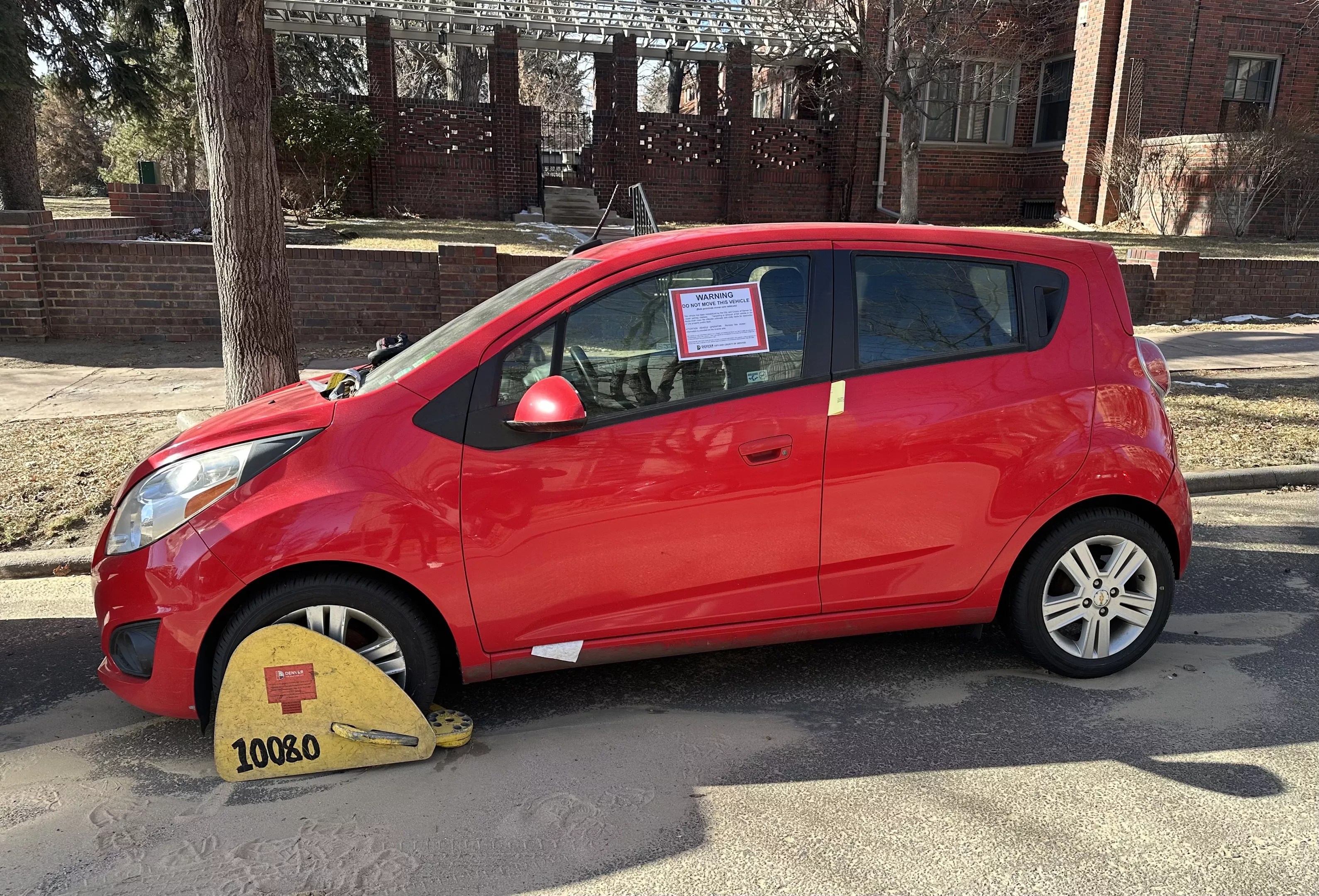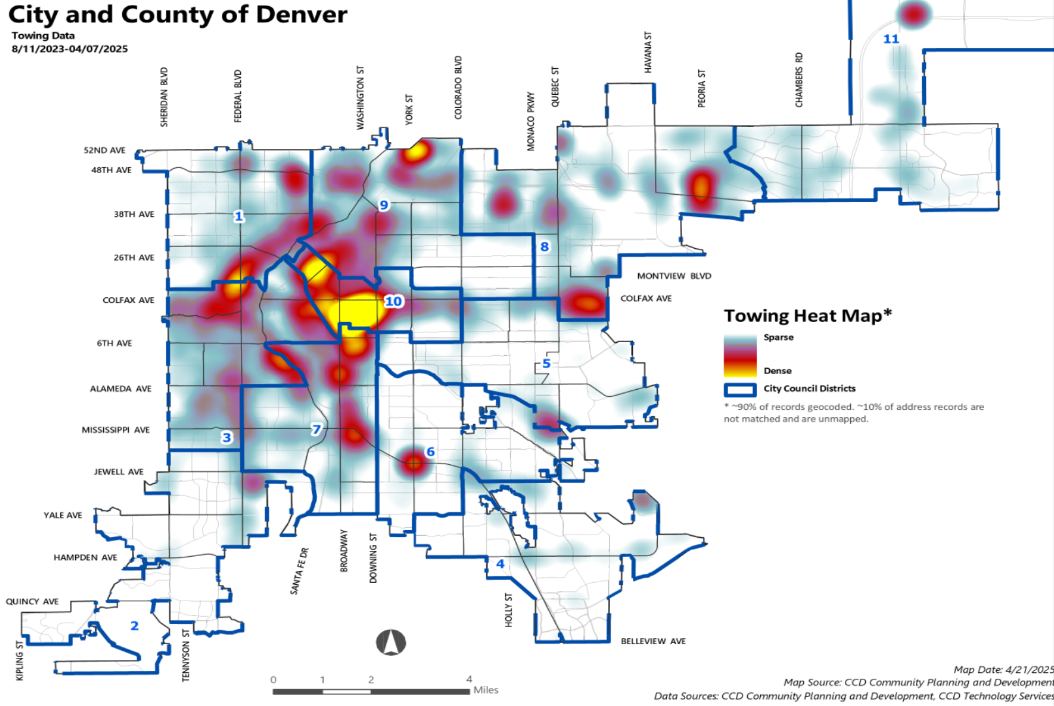
Thomas Mitchell

Audio By Carbonatix
A common and dreaded sight on Denver streets is a car that doesn’t move or seems to belong to anyone in particular, taking up valuable parking spaces.
In 2024, the Denver Sheriff Department identified and towed over 1,300 such vehicles across the city, with northeast and northwest Denver having the most abandoned cars. (Because the Denver Police Department has shifted away from policing low-level citations, enforcement of Denver’s rules for abandoned cars sits with the Sheriff Department.)
Abandoned vehicles are those left unattended and obstructing vehicle or pedestrian traffic, parked illegally, left unattended with the engine running or keys in the ignition, or left in the same spot for a continuous 72 hours. If a vehicle appears to be a “junker,” or a car that is inoperable or extensively damaged, then the vehicle can be considered abandoned after just 24 hours.
Of the 1,351 abandoned cars towed in Denver in 2024, 269 were in DPD District 1, which covers northwest Denver from the Regis neighborhood to Colfax Avenue west of Interstate 25 and Speer Boulevard.
The second-highest area for abandoned cars is District 5, where there were 261 abandoned vehicles in 2024. That district covers the Central Park, Green Valley Ranch and Montbello neighborhoods. Denver Police District 7, or Denver International Airport, uncovered 182 abandoned vehicles last year.
According to Sheriff’s Department communications director Daria Serna, District 3, which includes the University of Denver area and stretches to Aurora in the east, had a high volume of abandoned vehicles, as well, at 190 abandoned vehicles last year.
District 6, covering Capitol Hill and downtown Denver, had the fewest in 2024 with 53. However, broader city data shows that area, particularly Cap Hill, leads the city in cars being towed after they were reported stolen, in a crash, or blocking events or the public right of way.
Just over 3.5 recorded abandoned cars towed per day might not seem like a big amount for a major city like Denver, but a lot of the lonely vehicles you see for days or weeks might not be included in the Sheriff’s Department’s numbers.
Reporting Abandoned Cars in Denver is Difficult
“I don’t think it’s very clear where to go,” says City Council President Amanda Sandoval, whose district overlaps with DPD District 1. “If you Google ‘abandoned vehicles,’ a lot of the time people feel like they get put through a lot of bureaucracy.”
Denver’s vehicle impound facility has a specific phone number and online form to collect reports of abandoned vehicles. The VIF also works with 311 to collect complaints of abandoned cars. Additionally, the Mayor’s office and city council offices regularly report abandoned vehicles, according to Serna.
Sandoval and her staff field requests from constituents regularly about abandoned cars because people know her office will respond quickly and be able to point them in the right direction, she says. District 11 Councilwoman Stacie Gilmore says her office created a specific graphic to help people understand what to do if they suspect a car might be abandoned in their area because the process is so tricky to understand.
Gilmore’s infographic directs citizens to a different phone number if the vehicle appears to be occupied.
“There’s a lot when you’ve got to do a flow chart to figure out how to get an abandoned car off the roadway,” Gilmore says. “But there are issues to consider: Quite possibly, the car might have been used in a crime. You want to have a good process to make sure that you’re not interfering with evidence or anything like that.”
If a vehicle is towed for being abandoned and is later identified to have been stolen or used in a crime in Denver, the vehicle owner can get their car back without paying impound fees. However, people must wait until the criminal investigation is complete.
Gilmore says the complaints her office receives about abandoned cars usually end up being a result of a car being stolen and dumped on a neighborhood street in her district, which covers northeast Denver.
“Our residents are pretty attuned to their surroundings and can tell what belongs and what doesn’t,” she says.
Gilmore cautions people not to act too hastily as she worries for residents who may be living in their cars. Additionally, if someone went on vacation for a week and their vehicle is parked on the street in front of their house without being moved, that car is technically out of compliance with city code but isn’t actually abandoned.
The councilwoman once thought a car in her neighborhood may have been abandoned because it sat in front of her neighbor’s home with a broken window for days. Her husband eventually went to the neighbor’s house and discovered the car had been broken into and the window company would be coming to make the repair soon. In that case, she was glad she hadn’t called in the vehicle to report it.
“There’s a lot of criteria that you’ve got to wade through, because at the end of the day we definitely don’t want to tow someone’s private property if we did get it wrong,” Gilmore says, noting that, luckily, such a scenario has never happened with a report a constituent has sent her way.

This map shows where cars in Denver are towed the most, including cars that are abandoned or moved for other reasons.
City of Denver
According to Sandoval, her office saw an increase in reports of abandoned vehicles during and shortly after the COVID pandemic in 2020. Gilmore says her office experienced an uptick in reports during the second half of 2023.
Neither can pinpoint a reason, but Gilmore believes that Mayor Mike Johnston’s All In Mile High initiative may have led to the increased reports in her district. The initiative focused on moving people into housing from encampments or living on the street.
“Word on the street was, ‘well, if you’re part of an encampment, if you go out there and get your name on the list, you’ll get services and you’ll get accommodations,'” Gilmore recalls. “There were maybe a few more who were car camping together, maybe trying to access services.”
She says 2023 also saw high reports of cars being stolen from DIA, which is right next to her council district.
“They would abandon vehicles in neighborhoods for somebody else to come pick them up, but we had residents calling them in sooner,” Gilmore says.
How Much Denver Pays to Tow Abandoned Cars
Denver City Council is considering adding $10 million to a contract with Ferkam Inc., which currently provides towing services for the city. Ferkam’s current contract ran from August 2022 through August 2025, and the original $11.5 million maximum has almost been reached, with $11.45 million spent through March 2025.
The contract would run through August 2026 if councilmembers approve a $10 million extension. In a City Council Committee meeting on April 21, city staff shared that Ferkam charges Denver $190 to $225 to tow vehicles, depending on weight.
In 2023 and 2024, the city spent a little over $4 million per year on towing in total.
From August 2023 to April 2025, abandoned vehicles were the fourth-most-common reason for towing in the city, at 3,365 occurrences. Recovering stolen vehicles was the top reason for a tow, which the city did 7,820 times in the twenty-month period.
Though Denver collects impound and storage fees totaling around $150,000 per month, those fees do not offset the cost of towing, according to the April 21 presentation.
The city charges cars under 6,000 pounds $120 to be impounded and $20 per day if they aren’t claimed within 24 hours. For vehicles over 6,000 pounds, the fee is $170 plus $30 per day. Those fees can be waived if the vehicle was impounded because the owner was taken into custody and then released without charges, if the fees were accumulated because a car was held as evidence and the owner isn’t the one who committed the crime, or if the car was reported as stolen and then recovered.
After a vehicle is impounded, the city will notify lien, title and registered owners. Those people then have thirty days to recover the vehicle before it is put up for auction. Any proceeds from selling impounded cars at auction are used first to pay the impound and storage fees and then added to the general fund.
The Denver Department of Public Safety has a maximum budget of $450,000 this year to dispose of and recycle junker vehicles that are never claimed and would generate no value at auction.